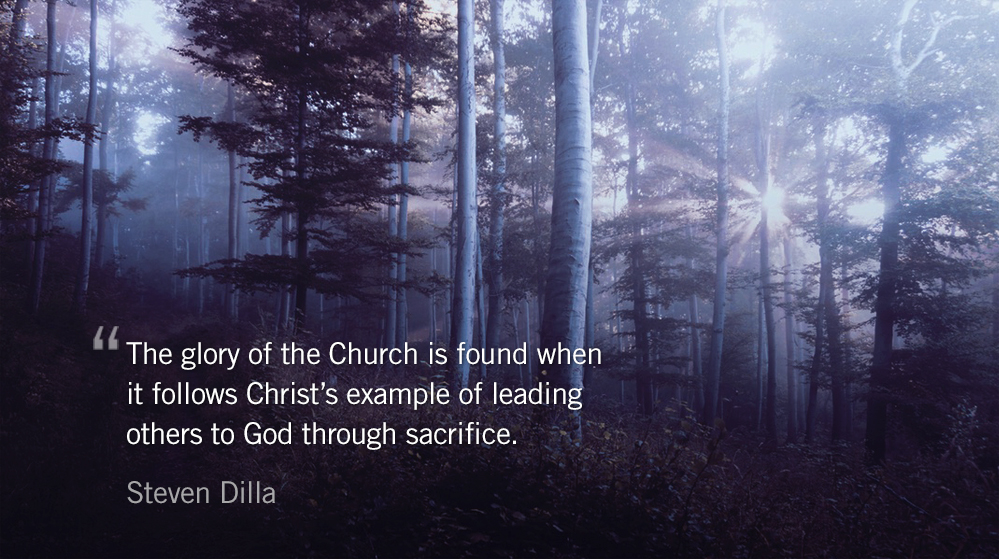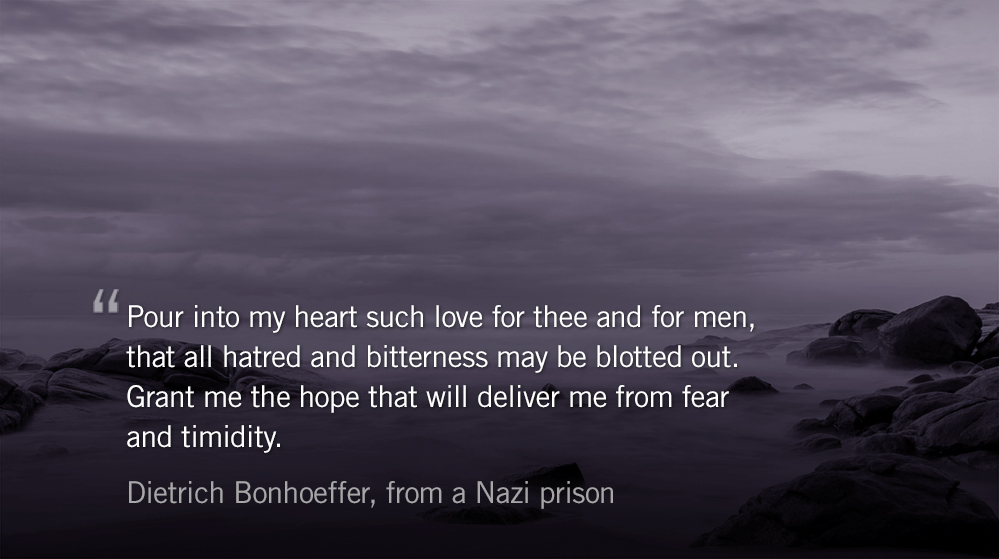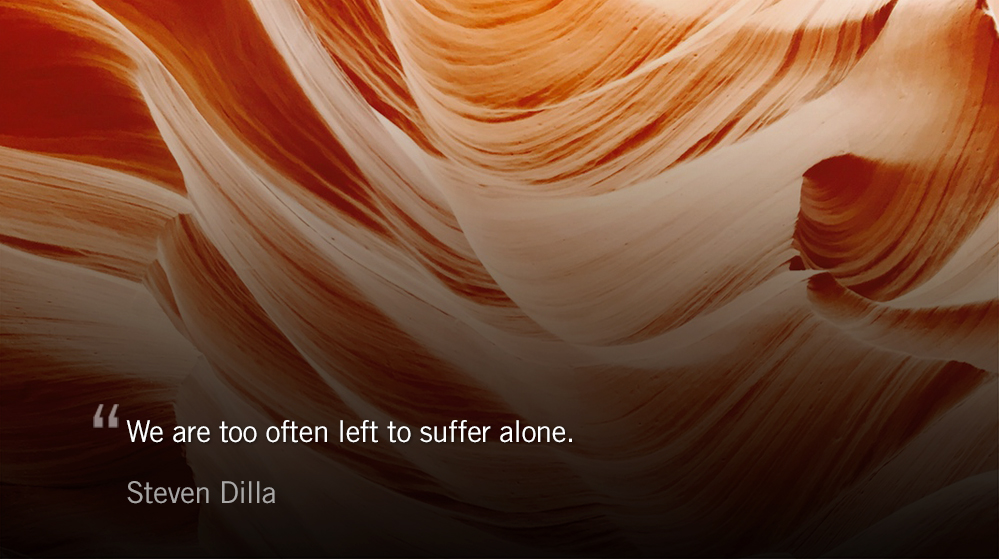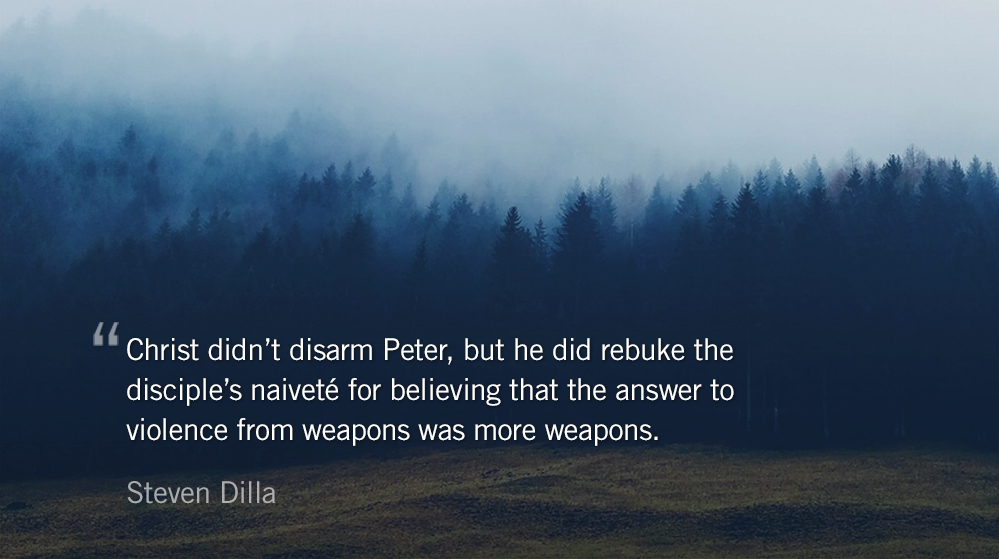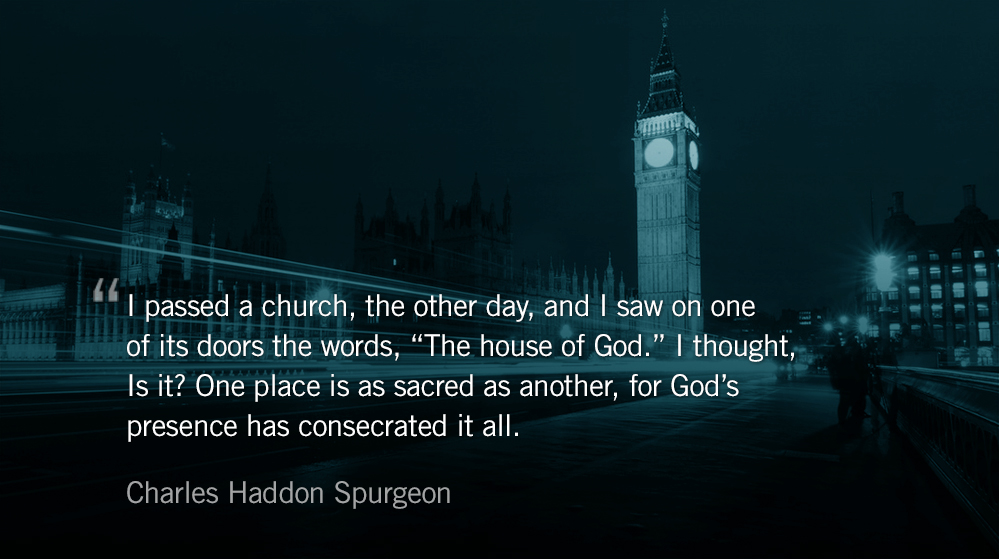Today’s Reading
Nehemiah 3 (Listen – 5:43)
Acts 13 (Listen – 7:36)
And when he had seized him, he put him in prison, delivering him over to four squads of soldiers to guard him, intending after the Passover to bring him out to the people. — Acts 12.4
I believe God will give us all the power we need to resist in all time of distress. But he never gives it in advance, lest we should rely upon ourselves and not on him alone. A faith as strong as this should allay all our fears for the future.
O God, early in the morning do I cry unto you. Help me to pray, and to think only of you.In me there is darkness, but there is light in you. I am lonely, but you do not leave me. I am feeble in heart, but you do not leave me. I am restless, but there is peace with you. In me there is bitterness, but there is patience with you; your ways are beyond understanding, you know the way for me.O Holy Spirit, grant me the faith that will protect me from despair: deliver me from the lusts of the flesh. Pour into my heart such love for thee and for men, that all hatred and bitterness may be blotted out. Grant me the hope that will deliver me from fear and timidity.Chiefly do I remember all my loved ones, my fellow-prisoners, and all who in this house perform their hard service.Lord have mercy. Restore me to liberty and enable me so to live now, that I may answer before you and before the world. Lord, whatever this day may bring, your Name be praised. Amen.
Today’s Reading
Nehemiah 2 (Listen – 3:42)
Acts 12 (Listen – 3:49)
“As soon as I heard these words I sat down and wept and mourned for days, and I continued fasting and praying before the God of heaven.” — Nehemiah (1.4)
There was only one variable that separated the people who have a strong sense of love and belonging and the people who really struggle for it. And that was, the people who have a strong sense of love and belonging believe they’re worthy of love and belonging. That’s it. They believe they’re worthy.
What they had in common was a sense of courage. And I want to separate courage and bravery for you for a minute. Courage, the original definition of courage, when it first came into the English language—it’s from the Latin word cor, meaning “heart”—and the original definition was to tell the story of who you are with your whole heart.These folks had, very simply, the courage to be imperfect. They had the compassion to be kind to themselves first and then to others, because, as it turns out, we can’t practice compassion with other people if we can’t treat ourselves kindly.
Today’s Reading
Nehemiah 1 (Listen – 2:06)
Acts 11 (Listen – 3:52)
Our teachings tell us that preserving human life is the greatest human calling, and murder the most depraved attack on man and G‑d there can be. — Rabbi Shlomo Yaffe
The scriptures have a profound way of speaking into modern life. The privilege of a spiritual kingdom, which stretches through time and culture, is that our understanding of how God’s word articulates today can be inspired by the faithful who walked in faith before us.
The ancient world was deeply marked by hostility and violence. The Hebrew Bible and rabbinic commentaries written during this time explored the profoundly spiritual implications of using weapons against others, protecting the innocent, and maintaining civility.
To understand what our sages would have thought about our modern problems of unlimited ammunition and semiautomatic weapons, we have to examine their perspective on the dangers of their time… Their wisdom remains eerily relevant. — Marc Katz
Weapon creation and sale was permitted in ancient Jewish culture, but multiple rabbinic writings prohibited the sale of a weapon to a suspected criminal or member of a country who served other gods (assuming they would be an enemy of the state).
To better understand how the rabbis applied their understanding of the scriptures to weapons, we can look at a more common instrument of self-defense: animals. Dogs used as a means of protecting life and property had to remain chained at all times. (If the owner lived in a rural area the dog could be loosed after dark.)
Dogs are not the most efficient or violent animals when it comes to taking a life, but other animals like wolves, lions, bears, leopards, panthers, and serpents, were entirely forbidden as means of protection. The rabbis believed that using these animals, due to their extreme unpredictability—and the damage they were capable of producing—was unfit for people of faith.
The image of blood is a central theme in scripture, often highlighting cases of either injustice or redemption. Tellingly, it is the image invoked when scripture speaks to the issue of home invasions.
If someone breaks in to another person’s home—in the dark—the writers of the Law permitted the victim to respond as if the criminal “had no blood,” thus prioritizing the lives of innocents. The ancient commentator Rashi says the thief is to be considered as dead “from the beginning.”
All other invasions and confrontations were excluded from this understanding. In general we see those furthest from protection—living in rural settings, under the veil of darkness—were given margin to be aggressive. Everyone else was called to restrain their reactions in order to protect the lives of themselves and those around them.
The overwhelming majority of what the rabbis wrote about about regulating weapons of defense prioritizes the conservation of life, not the protection of property. In Leviticus, God commands, “You shall not stand by [the shedding of] your fellow’s blood. I am the Lord.” More than a simple call to arms, it is a call to action to protect those God has placed around us through diligence and restraint as much as threat.
[The sages call] weapons a “disgrace” and point to the most famous prophetic text from the book of Isaiah to show that humanity’s goal is to someday make these weapons disappear: “And they shall beat their swords into plowshares, and their spears into pruning hooks; nation shall not lift up sword against nation, neither shall they learn war anymore.” — Marc Katz
Christ didn’t disarm Peter, but he did rebuke the disciple’s naiveté for believing that the answer to violence from weapons was more weapons—those who believe that, Jesus said, were as foolish as they were likely to die by the mechanism of their own violence.
Until the time when all humanity is fully disarmed by the peace of Christ, we tolerate weapons as necessary—though they are also byproduct and perpetuator of the brokenness and evil of our world. Legislations will come and go, political parties will change their positions, and evil will not be restrained by the power of man. Our ultimate hope rests in Christ. His return will bring the deeper repentance and restoration needed for peace on this earth.
Today’s Reading
Ezra 8 (Listen – 5:40)
Acts 8 (Listen – 5:10)
Ezra 9 (Listen – 3:19) Acts 9 (Listen – 6:05)
Ezra 10 (Listen – 6:19) Acts 10 (Listen – 5:49)
- The Jewish View on Weapons by Marc Katz, for Tablet.
- Battleground America by Jill Lepore, for The New Yorker. (The Harvard Historian looks at the founding, growth, and transition of the N.R.A. and America’s understanding of the Second Amendment.)
- How One Evangelical Activist Changed His Mind On Gun Violence by Sarah Pullman Bailey, for The Washington Post.
- How School Shootings Spread by Malcolm Gladwell, for The New Yorker.
By Charles Haddon Spurgeon (1834-1892)
Yet the Most High does not dwell in houses made by hands, as the prophet says, “Heaven is my throne, and the earth is my footstool. What kind of house will you build for me, says the Lord, or what is the place of my rest? Did not my hand make all these things?” — Stephen (Act 7.48-50)
I passed a church, the other day, and I saw on one of its doors the words, “The house of God.” I thought, Is it? On the next door, I saw the words, “The gate of heaven;” and I said to myself, It is not so, any more than any other door is.
Is this Tabernacle God’s house? While we worship him here, it is; but it is not any more holy than our own house is. One place is as sacred as another, for God’s presence has consecrated it all.
Every part of my garden, as I meditate upon God in it, is as holy as the aisles of the most venerable cathedral; your bed-chamber, as you kneel in prayer ere you lie down to sleep, is as sacred as the temple of Solomon. Every spot, where there is a devout worshipper, is the abode of Deity; it is no more and no less so in one place than in another.
If you begin to fancy that one place is sacred above others, you will tread there with superstitious reverence; you will scarcely dare to put your foot upon the chancel pavement, and you will bow to the East, as I have seen some do, as if there were something more holy in that direction than at other points of the compass. Ugh! But this is idolatry, and nothing better.
The right thing is to look upon the street pavements as too sacred for you to sin there, and to turn to the East or West, to the North or South. They who would come to God must believe that he is everywhere, and that he is specially where they are praying to him.
When we pray aright, we speak into God’s ear—into his very heart, for he is wherever there is a praying soul; and when you truly praise him, you are not singing to the wind, for God is there, and he hears you.
*Abridged and excerpted from Charles Haddon Spurgeon’s sermon, What Is Essential in Coming To God?, delivered December 12th, 1880.
Today’s Reading
Ezra 7 (Listen – 4:39)
Acts 7 (Listen – 8:49)
*Correction: A previous version of this post indicated the sermon was delivered August 18th, 1901, the date the transcript was re-read for a Sunday service.

